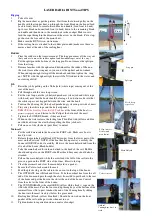
10
1.4.4 Attack Knob
(from 250 μs to 64 ms)
Unfortunately, the Attack knob has nothing to do with using the power
supply as a weapon or stopping the guitar player from playing too much!
The Attack knob controls how fast the compressor turns on after a signal
crosses the Threshold. If the Attack is set slow, the compressor will react
slowly to transients above threshold. If the Attack is set fast, the
compressor will react the instant the transient exceeds the Threshold. Fast
settings are to the left and slower settings are to the right. See Figure 3
below.
If you set the compressor‟s Attack too fast the transient will be attenuated
too much and the power of the instruments will be reduced. When drums
sound wimpy or flat, it is often because the Attack settings are too fast. If
you set the Attack to slow, you might miss the transients altogether and
not compress the audio enough.
If you have a lot quick explosive peaks, speed up the attack to prevent
overloads of downstream devices. If you don‟t have many fast peaks, use
slower settings to level out small dynamic changes in a vocal performance
or bass part.
Your Daking compressor is fast enough to control even the most intense
transients from drums and percussion. The fastest attack time on the FET
III is 250 μs (1/4 of a millisecond) while the slowest attack time is 64 ms.
1.4.5 Release Knob (from 500 ms to Dual Time Constant Auto)
There are NO hostages!
The Release knob controls how quickly the compressor stops
compressing after the signal drops below the Threshold. See Fig
3 below. The Release control can be used to lengthen sustain
times and to blend audio signals together. When Release times
are faster, the compression may be less obvious and be more
transparent. If Release times are set improperly the compressor
may sound as if it is causing the audio to swell, pump or breathe.
The Release time and behavior of a compressor is very important to the
signature sound of the unit. The FET III has release times that range from
about a half second to a dual time constant release based on the Audio &
Design (Recording) Limited‟s famous F760X 'Compex' limiter. When the
FET III is in full Auto mode, the release starts out pretty fast, but then
slows down. The total release time can be as long as 7-8 seconds, but dual
time constant makes it sound very natural. See Figure 3.









































